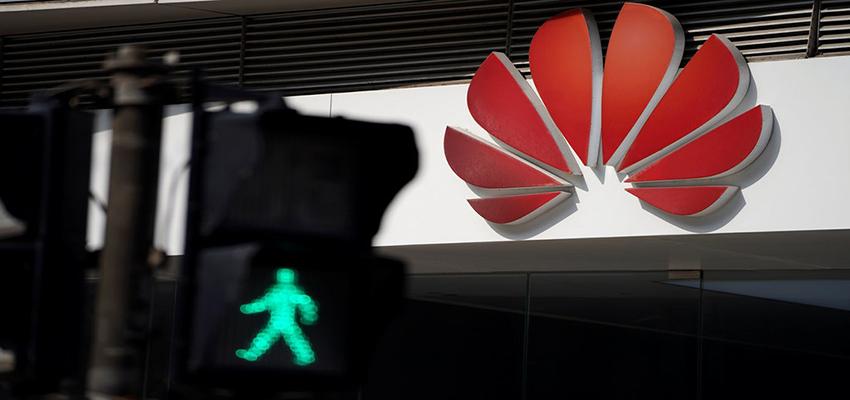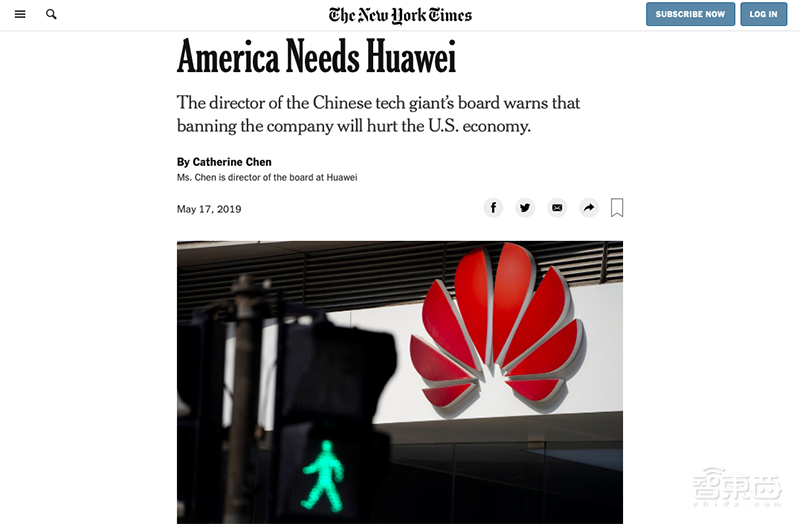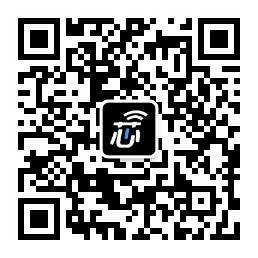
华为董事、高级副总裁陈黎芳,近日在《纽约时报》发表了一篇文章: 《美国需要华为(America needs Huawei)》。
文中重点如下:
1、华为每年从美国公司采购超过110亿美元的商品和服务,全面禁止华为设备将导致美国数以万计就业机会消失。
2、在美国存在服务不足的偏远农村地区,有数十个4G网络安装了华为设备。
3、禁令将使美国独立小电信运营商无法开发新服务,为数百万人提供更快速的宽带连接。
4、封杀华为可能会使美国在推出5G网络方面无法与世界其他地区保持同步,从而损害美国经济。
5、禁令将无法实现让美国数字网络更安全的目标。
6、华为已反复表示,其将拒绝要求攻击或监视客户的任何命令。
7、把一家公司列入黑名单,将大幅减少竞争,导致成本上涨。
8、华为希望能得到洽谈类似政府监控的风险缓释协议的机会。
9、封杀任何公司将削弱竞争、推迟5G的普及、减少创新,且使美国消费者和企业无法获得一些世界上最先进的通信技术。

以下是陈黎芳《美国需要华为(America Needs Huawei)》中英双语版全文:
美国总统上周三签署行政令,宣布进入“国家紧急状态”,此举可能会为禁止华为设备在美国销售铺平道路。此外,由商务部长威尔伯·罗斯(Wilbur Ross)发布、上周五生效的一项命令要求,世界领先的电信设备供应商华为在向美国企业购买零部件和技术之前需征得美国政府的许可。
The director of the Chinese tech giant’s board warns that banning the company will hurt the U.S. economy.
An executive order signed by President Trump on Wednesday may lay the groundwork for a ban on the sale of Huawei’s equipment in the United States by declaring a “national emergency.” Additionally, an order issued by Commerce Secretary Wilbur Ross that goes into effect today will prevent Huawei — the world’s leading telecom equipment provider — from buying components and technology from American businesses without United States government approval.
商务部要求美国公司须获得特殊许可证才能出售零部件给华为,这一决定将使华为很难——甚至可能完全无法——获取其网络交换设备和智能手机所需的关键元器件。但禁令并不会使得美国网络更安全。相反,它将损害普通美国人和企业的利益,使他们无法获得领先技术、减少竞争、提升价格。
The Commerce Department’s decision to require American companies to get special licenses to sell components to Huawei could make it hard — if not impossible — for the company to obtain key components for its network switching equipment and smartphones. But a ban will not make American networks more secure. Instead, it will hurt ordinary Americans and businesses by denying them access to leading technology, reducing competition and increasing prices.
华为每年从美国公司采购超过110亿美元的商品和服务,禁令将给与华为有业务往来的美国公司的成千上万美国员工造成经济损失。全面禁止华为设备将导致美国数以万计就业机会消失。
The ban will financially harm the thousands of Americans employed by the U.S. companies that do business with Huawei, which buys more than $11 billion in goods and services from U.S. companies each year. A total ban on Huawei equipment could eliminate tens of thousands of American jobs.
在美国存在服务不足的偏远农村地区,有数十个4G网络安装了华为设备,禁令将使得俄勒冈东部电信(Eastern Oregon Telecom)和怀俄明联合无线(Union Wireless)这样的美国独立小电信运营商无法开发新服务,为数百万人提供更快速的宽带连接。这些运营商将被迫花费有限的资金,用华为的竞争对手提供的更昂贵设备来取代华为设备(有爱立信和诺基亚两家可选,均非美国公司)。
Because Huawei equipment is installed in dozens of 4G networks in underserved remote and rural parts of the country, a ban would prevent small, independently owned American telecom operators such as Eastern Oregon Telecom and Union Wireless in Wyoming from developing new services and delivering faster broadband connections to millions of people. Instead, those operators would be forced to spend their limited funds replacing Huawei equipment with more expensive gear supplied by its competitors (there are two — Ericsson and Nokia — and neither is an American company).
华为是行业公认的5G技术领导者。封杀华为可能会使美国在推出5G网络方面无法与世界其他地区保持同步,从而损害美国经济。美国到头来可能会落后于许多计划推出5G的欧洲和亚洲国家——从而让这些国家得以先行一步,向其居民提供新产品和服务,当初美国迅速推出上一代4G无线技术时,美国企业就是这样做的。
Huawei is the acknowledged industry leader in 5G technology. Blocking it could harm the American economy by preventing the United States from keeping pace with the rest of the world in rolling out 5G networks. The United States could end up falling behind the many European and Asian countries that plan to introduce 5G networks — ensuring that those countries take the lead in delivering new products and services to their residents, just as American companies did when the country moved quickly to roll out 4G, the previous generation of wireless tech.
最重要的是,禁令将无法实现让美国数字网络更安全的目标。
Most important, a ban would fail to achieve its goal of making the country’s digital networks more secure.
美国官员担心使用中国的设备将使北京当局能够关闭手机、电力、银行及其他关键服务。确保我们电信网络的安全性是运营商、设备供应商和服务提供商的共同责任,他们要共同采取有保证的、透明的风险缓释措施。电信运营商控制着网络和流通于其中的数据,鉴于当前可用的风险缓释程序,要避过它们的控制将极其困难。华为已反复表示,其将拒绝要求攻击或监视客户的任何命令。
American officials worry that using Chinese equipment would allow Beijing to shut off phones, power, banking and other critical services. The security of our telecommunications networks is a responsibility shared by operators, equipment vendors and service providers to collectively perform risk mitigation with assurance and transparency. Telecom operators control the network and the data moving across it, and circumventing their controls would be extremely hard, given the available risk-mitigation processes. Huawei has repeatedly said it would refuse any order to attack or spy on its customers.
此外,仅仅因为总部在中国便专门针对华为也不甚合理。和华为一样,诺基亚和爱立信这类电信公司采用全球供应链。他们使用中国开发或制造的设备,美国网络中所安装的多数电信和网络设备也是如此。把一家公司——或一个国家的所有公司——列入黑名单,无益于缓释该全球供应链的风险,反而将大幅减少竞争,不可避免地导致成本上涨。
Moreover, singling out Huawei because it is headquartered in China makes little sense. Telecommunications companies such as Nokia and Ericsson draw from a global supply chain, as Huawei does. They use equipment developed or manufactured in China, which accounts for much of the telecommunications and internet gear currently installed in American networks. Blacklisting one company — or all of the companies from one country — does nothing to mitigate this global supply chain risk and will substantially reduce competition that will inevitably increase costs.
政令及商务部的规定旨在防止恶意袭击者给电信网络植入恶意软件,从而暗中监控网络流量或发起网络攻击。这项目标反映出一项现实状况,即全球通信网络难以抵御民族国家发起的高水平攻击,如通过虚拟方式在软件和硬件中植入可编程代码和可利用的漏洞。但这种代码可能会影响到所有设备供应商——甚至是那些看起来可能对美国友好的国家——它需要在风险缓释过程中给予保障和透明度。
The executive order and the Commerce Department’s regulation aim to prevent malicious actors from inserting malware into telecommunications networks that could surreptitiously monitor network traffic or launch a cyberattack. This aim reflects the reality that the world’s communications networks are vulnerable to attack by sophisticated nation-states, such as by implanting programmable code and exploitable vulnerabilities in hardware and software by virtual means. But such code can compromise the product of any equipment vendor — even those from countries that might seem friendly to America — which requires assurance and transparency in risk mitigation.
美国政府已和位于欧洲的诺基亚及爱立信签订了政府监控的风险缓释协议,允许它们在美国开展业务,即便它们在中国有广泛业务。华为希望能得到洽谈类似协议的机会。
The United States government has entered into agreements for government-monitored risk mitigation with Nokia and Ericsson, which are based in Europe, allowing them to do business in this country despite their extensive operations in China. Huawei would welcome the opportunity to discuss similar agreements.
如果是真心实意地希望保护美国的网络,白宫和商务部就不应该去封杀某一家公司,而是应该根据一种受认可的最佳实践制定综合的风险管理方案。事实上,这恰恰是国土安全部(Department of Homeland Security)去年所倡导的策略。
If the White House and Commerce Department really want to protect American networks, they will focus not on barring individual companies but on establishing a comprehensive risk management approach that relies on recognized best practices. In fact, that is precisely the strategy advocated last year by the Department of Homeland Security.
封杀任何公司——何况是行业领导者华为——将削弱竞争、推迟5G的普及、减少创新,且使美国消费者和企业无法获得一些世界上最先进的通信技术。特朗普政府应当停止这些虚有其表的策略,转而制定对美国通信网络各个部分进行检测和保护的透明框架。
A move to block any company — let alone Huawei, the industry leader — will weaken competition, delay 5G adoption, reduce innovation and prevent American consumers and businesses from having access to some of the world’s most advanced communications technology. The Trump administration should abandon its apparent course and instead develop a transparent framework to test and secure all parts of America’s communications networks.
陈黎芳(Catherine Chen)是华为董事会成员。
翻译:李建芳
原文链接:
https://cn.nytimes.com/opinion/20190520/executive-order-china-huawei-ban/dual/









